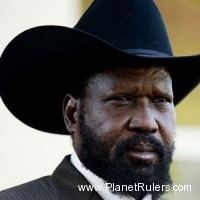Salva Kiir Mayardit, President of South Sudan (since Jul 11, 2011)

An attempt to remove Kiir from his post as SPLA chief of staff in 2004 nearly caused the organization to split. Following the signing of the Comprehensive Peace Agreement formally ending the war in January 2005, which he had helped start, he was appointed Vice President of Southern Sudan. Perhaps significantly, former Southern Sudan president John Garang like Kiir is of the Dinka people, though of a different clan. After the death of Garang in a helicopter crash of 30 July 2005, Kiir was chosen to succeed to the post of First Vice President of Sudan and President of Southern Sudan. Kiir is popular among the military wing of the SPLM for his battlefield victories and among the populace for his unambiguous pro-secession stance.
Comments by Kiir in October 2009 that the forthcoming independence referendum was a choice between being “a second class in your own country” or “a free person in your independent state” were expected to further strain political tensions. Reports in January 2010 that Kiir would not contest April elections for Sudanese president, but would focus on re-election as president of Southern Sudan were interpreted to mean that the SPLM priority is independence.
Kiir was re-elected with 93% of the vote in the 2010 Sudanese election. Although the vote on both the national and sub-national level was criticized by democratic activists and international observers, the overwhelming margin of Kiir’s re-election was noted by some media as being “Step One” in the process of secession. Following his re-election, Omar al-Bashir reappointed Kiir as the First Vice President of Sudan in accordance with the interim constitution.

